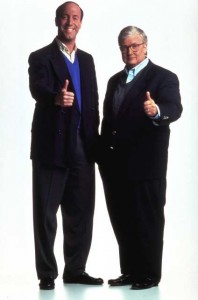Goodbye to an inspiration
 Roger Ebert understood the power of story.
Roger Ebert understood the power of story.
Before the internet had tubes, before Apple Trailers and Facebook, DVRs and XBox Live… before all the ways we can access movies and movie trailers… and before Metacritic and Rotten Tomatoes aggregated what reviewers and viewers were saying, the single best source I had growing up for a glimpse of movies and an expectation of their worth was Siskel and Ebert At the Movies. Siskel passed away in 1999, and The Chicago Sun Times just reported that Ebert has died after a battle with cancer.
The opening theme would echo through the Harleman house, and I’d drop my Star Wars toys and haul ass down the hall to the living room. It was one of the only places I could see footage beyond a movie trailer, plus a couple educated guys discussing the film’s worth, be it the acting or story or cinematography. I would imagine myself talking with them (or my brother and I hosting our own show) and I can’t help but think a goodly portion of why Cinemagogue exists is due to the influence of watching these two verbally joust and entertain the deeper nuances of a movie’s story and resonance. An honoring article from The Hollywood Reporter included this quote:
Ebert wrote that he eventually would follow the advice of a film critic he admired, Pauline Kael of The New Yorker: “I go into the movie, I watch it, and I ask myself what happened to me.”

Roger Ebert understood that entertainment simply doesn’t distract us, but that it influences us, even transforms us. With over 5,000 reviews and 17 books, I am blown away by how prolific this man was about his passion. Although I differed sharply on some of his opinions, more often than not I agreed with his “thumbs up” or “thumbs down”. And even when I liked a film he didn’t, there would still be some truth in his criticisms. From what I can know of Ebert, we probably differed on the ultimate story we’re all living in. I was struck by this quote from his review of A Woman Under the Influence:
“There is no safe resolution at the end of a Cassavetes film. You feel the tumult of life goes on uninterrupted, that each film is a curtain raised on a play already in progress. The characters seek to give love, receive it, express it, comprehend it. They are prevented by various addictions: booze, drugs, sex, self-doubt. Self-help gurus talk about ‘playing old tapes.’ Cassavetes writes characters whose old tapes are like prison cells; their dialogue is like a call for help from between the bars.”
Since I don’t really know Roger Ebert, or his heart, or his final days on this earth, I don’t know what he looked forward to as the curtain of his life began to lower. He describes his mother as “faith-obsessed”, and fought his own battle with alcoholism and went through AA. Losing his lower jaw, and the final years with cancer must have held much hardship and suffering. But unlike his assessment of Cassavetes films, I pray there was safe resolution for Roger Ebert as his story neared the final reel. A lover and critic of story and cinema is now in the hands of the master storyteller, and his presence here will be missed.



